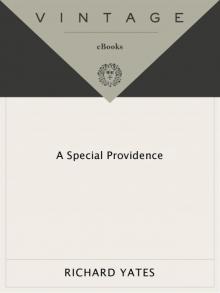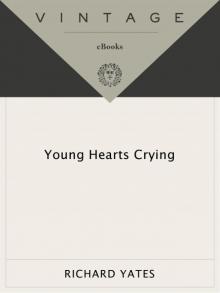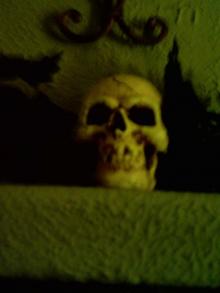- Home
- Richard Yates
The Easter Parade Page 18
The Easter Parade Read online
Page 18
‘They didn’t arrest him, did they? If they’d had any evidence they’d have arrested him.’
‘Well, but he and the boys could’ve concealed the evidence.’
‘Honey, we’ve been over all this a hundred times. It’s just one of those things you’ll never know. Life is full of things like that.’
Three or four old barns went by, and then any number of suburban developments, and then the beginnings of the Bronx; they were all the way to the Henry Hudson Bridge before she said ‘You’re right.’
‘Right about what?’
‘Life is full of things like that.’
There were things she would never know about Howard, too, however much she might love him. Sometimes it seemed that she scarcely knew him at all.
Things weren’t going very well at work. Hannah Baldwin seldom asked Emily out to lunch any more – she had taken to having lunch with one of the younger women in Emily’s department – and she seldom called her ‘honey,’ nor did she often come out of her private office to place one stout, well-clad haunch on the edge of Emily’s desk and waste whole hours with idle chatter in the middle of a working day. She had begun to give her what Emily described to Howard as ‘funny looks’ – speculative, not very friendly looks – and she found things to criticize in the way Emily did her job.
’This copy’s flat,’ she said once of something on which Emily had worked for many days. ‘It just lies there. Isn’t there some way you can breathe a little life into it?’
When the name of a Swedish importer came out in print without the umlaut over one of its vowels, Hannah heavily implied that it was all Emily’s fault. And when Emily let a National Carbon ad go through production without noticing that the words ‘patent pending’ did not appear after ‘Tynol,’ Hannah behaved as if it were a calamity. ‘Have you any idea what the legal implications are in a thing like this?’ she demanded.
‘Hannah, I’m sure it’ll be all right,’ Emily said. ‘I know the legal counsel for National Carbon.’
Hannah blinked and squinted. ‘You “know” him? What do you mean, you “know” him?’
Emily felt blood in her face. ‘I mean we’re friends.’
There was a pause. ‘Well,’ Hannah said at last, ‘it’s nice to have friends, but it doesn’t have much to do with the business world.’
That night Emily told Howard about it, at dinner, and he said ‘Sounds to me like she’s going through menopause. Not a hell of a lot you can do about that.’ He sliced off a piece of steak and chewed it thoroughly before swallowing. Then he said ‘Why don’t you quit the damn job, Emily? You don’t have to work. We don’t need the money.’
‘No, no,’ she said quickly. ‘It’s not that bad; I’m not ready to do anything like that.’ But later, standing at the sink to wash the dishes while he fixed himself an after-dinner drink, she felt a powerful urge to cry. She wanted to go to him and weep attractively against his shirt. He had said ‘We don’t need the money,’ just as if they were married.
One evening, a year after Sarah’s death, a tired woman’s voice identifying itself as Central Islip State Hospital called up to say ‘We regret to inform you of the death of Esther Grimes.’
‘Oh,’ Emily said. ‘I see. Well, can you tell me what the procedure is?’
‘The procedure?’
‘I mean – you know – about funeral arrangements.’
‘That’s entirely up to you, Miss Grimes.’
‘I know it’s up to me. All I mean is—’
‘If you wish a private funeral, we can recommend several funeral homes in this area.’
‘Just recommend one, okay?’
‘My instructions are to recommend several.’
‘Oh. Well, okay, wait – let me get a pencil.’ And as she passed Howard’s chair on her way from the phone she said ‘My mother’s dead. Whaddya know about that?’
When her business was concluded Howard said ‘Emily? Would you like me to go along with you out there tomorrow?’
‘Oh, no,’ she told him. ‘It’ll just be an awful little ceremony at the whaddyacallit, the mortuary. I can handle it myself.’
All three of Pookie’s grandsons were waiting under the Central Islip trees when Emily’s taxi pulled up outside the mortuary the next afternoon. They were the only people there. Peter left his brothers and came forward to help her out of the cab, smiling. ‘Good to see you, Aunt Emmy,’ he said. He was wearing a clerical collar; he had been ordained. ‘Normally they send a priest over from the hospital to perform these services,’ he said, ‘but I asked if I could do it and they said okay.’
‘Well, that’s – that’s fine, Peter,’ she said. ‘That’s very nice.’
The dim chapel smelled of dust and varnish. Emily, Eric and Tony Junior sat in the front pew, facing the altar where Pookie’s closed coffin lay between two candlesticks. Then Peter came in through a side door, wearing some kind of Episcopalian stole, and began to read aloud from his prayer book.
‘… We brought nothing into this world, and it is certain we can take nothing out. The Lord gave, and the Lord hath taken away; blessed be the name of the Lord…’
When it was over, Emily went out to the office and up to a cashier’s window, where a man gave her an itemized invoice and accepted her check in payment, after asking to see her driver’s license. ‘You may accompany the remains to the crematory,’ he said, ‘but I wouldn’t recommend it. There’s nothing to see.’
‘Thank you,’ she said, remembering the twin smokestacks on the Central Islip horizon.
‘Thank you.’
The three Wilson boys were waiting for her. ‘Aunt Emmy?’ Peter said. ‘I know my father’d like to see you. Can I drive you over there, just for a few minutes?’
‘Well, I – all right, sure.’
‘How about you guys?’
But it turned out that both his brothers had to get back to their jobs, and after they’d mumbled goodbye their cars roared away in different directions.
‘My father’s married again,’ Peter said as he drove her down a long straight road. ‘Did you know that?’
‘No; no, I didn’t.’
‘Best thing in the world for him. He married a very nice lady who owns a restaurant in St. Charles, a widow. They’d been friends for years.’
‘I see. And do they live in the old—’
‘Oh, no; Great Hedges is long gone. He sold it to a developer soon after my mother died. There’s nothing out there now but dirt and bulldozers. No, he moved in with his new wife – her name’s Vera – in an apartment over the restaurant. It’s very nice. And he’s retired from Magnum – did you know that?’
‘No.’
‘Well, he was in a bad car accident about six months ago, suffered a bad head injury and broke his shoulder, so he took his retirement early. Now he’s just sort of recuperating and taking things easy; I imagine when he’s ready to work again he’ll go partners with Vera in the restaurant business.’
‘I see.’ After a while it occurred to her to ask about old Geoffrey. ‘How’s your grandfather, Peter?’
‘Oh, he died, Aunt Emmy. He died last year.’
‘Well, I’m – very sorry to hear that.’
The fields on either side of the road gave way to dense masses of houses, and to shopping centers with acres of parked cars. ‘Tell me about yourself, Peter,’ she said. ‘Where are you located now?’
‘I lucked into a terrific job,’ he said, glancing briefly away from the wheel. ‘I’m assistant chaplain at Edwards College, up in New Hampshire. Have you heard of Edwards?’
‘Certainly.’
‘I couldn’t have asked for a better situation in a first job,’ he went on. ‘My boss is a fine man, a fine priest, and we seem to think alike. The work is very challenging and very gratifying. Besides, I like working with young people.’
‘Mm,’ she said. ‘Well, that’s fine. Congratulations.’
‘What about you, Aunt Emmy?’
‘Oh, things are
pretty much the same with me.’
There was a long pause. Then, staring meditatively at the road ahead, he said ‘You know something? I’ve always admired you, Aunt Emmy. My mother used to say “Emmy’s a free spirit.” I didn’t know what that meant when I was little, so I asked her once. And she said “Emmy doesn’t care what anybody thinks. She’s her own person and she goes her own way.”’
The walls of Emily’s throat closed up. When she felt it was safe to speak she said ‘Did she really say that?’
As nearly as I can remember, that’s exactly what she said.’
They were traveling now through suburban streets so thickly populated that he had to keep braking for stoplights. ‘It’s not much farther,’ he said. ‘Right around this next corner… Here.’
The restaurant’s sign promised STEAK and LOBSTERS and COCKTAILS, but it had a dreary look: the paint was flaking off its white clapboard front, and its windows were too small. It was the kind of place that a hungry man and woman in a car might spend several minutes considering. (‘Whaddya think?’ ‘Well, I don’t know; it looks sort of awful. Maybe there’ll be a better place further on.’ ‘Honey, I’ve told you: there won’t be anything else for miles.’ ‘Oh, well, in that case – sure; what the hell.’)
Peter parked in the weed-grown gravel of its parking lot and led Emily around behind the building to a wooden staircase that led up to a second-story door.
‘Dad?’ he called. ‘You home?’
And there was Tony Wilson, looking like an aging, bewildered Laurence Olivier as he opened the flimsy door and let them in. ‘I say,’ he said. ‘Hello, Emmy.’
The small apartment had a makeshift look – it reminded Emily of Pookie’s old apartment over the garage at Great Hedges – and it contained too much furniture. Two of Tony’s ancestors stared from the cluttered walls; the other pictures were the kind that come with picture frames purchased in a five- and ten-cent store. Vera came bustling in from the kitchen, all smiles, a vigorous big-boned woman in her forties, wearing shorts.
‘I hope you won’t think my legs are always this heavy,’ she said. ‘I have these terrible allergies, and sometimes they make my legs swell up.’ And she struck her fist against one quivering thigh to indicate the excess flesh. ‘Can you find a place to sit down? Peter, move that box out of the blue chair so she can sit down.’
‘Thank you,’ Emily said.
‘We were so sorry to hear about your mother,’ Vera said in a lowered voice, sitting beside Tony on a small sofa that Emily recognized from the old house. ‘You only get one mother.’
‘Well, she’d been – very sick for a long time.’
‘I know. My mother went the same way. Five years in and out of the hospital, in constant pain. Cancer of the pancreas. My first husband, too – cancer of the colon. He died in agony. And this one.’ She nudged Tony heavily in the upper arm. ‘God, what a scare he gave me. Did Peter tell you about the accident? Oh, I forgot to offer you something. Would you care for some coffee? Or some tea?’
‘No, thanks; neither one. I’m fine.’
‘Have a cookie, anyway; they’re good.’ She pointed to a plate of chocolate-chip cookies on the coffee table. Peter reached over and took one, which he munched while she went on talking. ‘Anyway,’ she said, ‘the Highway Patrol called me at five-thirty in the afternoon, and I got over to the hospital before they started working on him. They had him lying on a stretcher in the emergency room, unconscious, blood all over the place, and I swear to God I thought he was dead. His brains were spilling out.’
‘Okay, Vera,’ Peter said around a mouthful of cookie.
She turned on him, her eyes round with innocence and indignation. ‘You don’t believe me? You don’t believe me? I swear to God. I swear to God, Peter, the man’s brains were spilling out in his hair.’
Peter swallowed. ‘Well,’ he said, ‘at least they managed to patch him up.’ And he turned to his father. ‘Dad, here’s the piece I was telling you about, the one I thought you might like to read.’ From the inside pocket of his coat he drew a folded brochure, handsomely printed on rich tan paper, with an old-English kind of crest and the words ‘Edwards College’ as part of its heading.
‘What’s this?’ Vera demanded, still bridling over his disbelief of the brains in the hair. ‘A sermon or something?’
‘Oh, come on, Vera,’ Peter said. ‘You know I don’t give you sermons. It’s just a bulletin my church puts out.’
‘Mm,’ Tony said. He pulled a pair of reading glasses from his shirt pocket, put them on and peered through them at the brochure, blinking several times.
‘That first article is by my boss,’ Peter explained. ‘You might enjoy reading that too. My own piece is on the inside page.’
‘Mm.’ Tony carefully put the brochure away in his shirt pocket, along with his glasses and his pack of cigarettes, and said ‘Ve’y good, Pete.’
‘Oh, this Peter,’ Vera confided to Emily. ‘Isn’t he too much? Isn’t he gonna make some girl happy one of these days?’
‘He certainly is.’
‘Tony Junior and I have our problems,’ she said, ‘and Eric – well, I don’t know about Eric; but this Peter. He really is too much. Only you know what, though? They’re spoiling him, all those women up at Edwards College. Spoiling him rotten. They feed him; they make his bed for him; they take out his laundry for him—’
‘Okay, Vera,’ Peter said, and then he inspected his watch. ‘I guess we’d better be getting started, Aunt Emmy, if we want to make that train.’
Once during the following winter Howard had to go to Los Angeles again – the seventh or eighth such trip he’d made since she’d known him.
‘I won’t need all this heavy stuff,’ he said when she was helping him to pack. ‘You don’t understand how warm it is out there.’
‘Oh,’ she said. ‘That’s right, I forgot.’ And she let him do the rest of the packing by himself.
She went into the kitchen to make coffee, but changed her mind and fixed herself a drink instead. These departures were always upsetting. She was determined not to ask him if he intended to see Linda: the last time she’d asked him that, on his third or fourth trip, it had brought on what almost amounted to a fight. Besides, she assured herself as the alcohol warmed her blood, it wasn’t really very likely. He and Linda had been separated for almost six years now – six years, for God’s sake – and though he sometimes still talked about her in the old infuriating way, it certainly ought to be clear by now that the marriage was dissolved.
But that brought up the insidious question that had nagged her from the beginning, threatening time and again to make her fly at him with shrill and redundant demands for an answer: if the marriage was dissolved, why didn’t they get a divorce?
‘What’s the deal?’ Howard said, smiling in the kitchen doorway. ‘You drinking alone?’
‘Sure. I always drink alone when you go on these trips. I’m getting in practice for when you disappear to California for good. Give me a few years and I’ll be one of these terrible old ladies you see on the street with four shopping bags, picking through trash cans and talking to themselves.’
‘Cut it out, Emily. You mad at me? What’re you mad about?’
‘Of course I’m not “mad” at you. Would you like a drink?’
That particular California trip gave her no cause for worry. He called her four times while he was gone, and the fourth time, when he said he was tired, she said ‘Listen, Howard: don’t go through that awful business of taking a cab home from the airport. I’ll drive the car out and meet you.’
‘No, no,’ he said. ‘You don’t have to do that.’
‘I know I don’t have to. It’s just a thing I’d like to do.’
There was a pause while he seemed to think it over. Then he said ‘Okay, good. You’re a sweetheart, Emily.’
She wasn’t used to driving his big, quiet car, especially at night and in the rain. Its power and fluidity frightened her – she applied the br
akes more often than necessary, causing drivers behind her to sound their horns – but she enjoyed the rich, massive feel of it and the way the dark, dark green of its broad hood was pearled with trembling raindrops.
Howard looked drawn and exhausted as he emerged from the plane ramp – he looked old – but when he caught sight of her his face glowed in a way that was almost boyish. ‘Damn,’ he said. ‘It sure is nice to find you waiting here.’
Less than a year later he went to California again – and this time his absence was filled with silence and dread. She couldn’t even plan to meet him with the car because she wasn’t sure which day or night he’d come home, let alone on which flight. All she could do was wait – trying to appease Hannah Baldwin’s disgruntlement through the working hours, trying to suppress a keen temptation to drink herself to sleep in the evenings.
Once during that time, walking back to the office after lunch, she saw a haggard, petulant woman’s face – a face that anyone would have said was aging badly (lined and deeply shadowed eyes; a weak, self-pitying mouth) – and found with a shock that it was herself, caught unawares in the reflection of a plate-glass window. That night, alone at the bathroom mirror, she tried any number of ways to make the face look better: crinkling its eyes in a subtle smile and then in a wider smile of pure delight, tightening and loosening its lips to varying degrees, using a hand mirror to gauge the effects of its profile from different angles, experimenting tirelessly with new ways of enhancing its shape through different arrangements of her hair. Then, in front of the full-length mirror in the vestibule, she took off all her clothes and scrutinized her body under bright lights. Her belly had to be sucked flat before it looked right, but having small breasts was almost an advantage now; there wasn’t much that age could do to them. Turning away, she peered over her shoulder to confirm the knowledge that her buttocks were underslung and the backs of her thighs wrinkled; but in general, she decided, facing the mirror again, she wasn’t bad at all. She paced off a distance of ten feet, until she stood on the living-room carpet, and there she went through a series of the steps and positions she had learned in a modern dance class at Barnard. It was good exercise, and it gave her a proudly erotic feeling. The distant mirror showed a slim, lithe girl in effortless motion, until she put a foot wrong and froze into awkwardness. She was breathing hard and beginning to sweat. This was silly.

 The Collected Stories
The Collected Stories A Special Providence
A Special Providence Young Hearts Crying
Young Hearts Crying Easter Parade
Easter Parade A Good School
A Good School Cold Spring Harbor
Cold Spring Harbor Eleven Kinds of Loneliness
Eleven Kinds of Loneliness Disturbing the Peace
Disturbing the Peace Liars in Love
Liars in Love The Collected Stories of Richard Yates
The Collected Stories of Richard Yates Night Noises
Night Noises Disturbing the Peace (Vintage Classics)
Disturbing the Peace (Vintage Classics) The Easter Parade
The Easter Parade